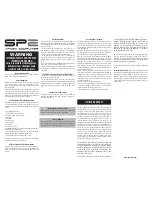
Megohmmeter Models 5000N/5100/5110
- 37 -
THE EFFECTS OF TEMPERATURE
Insulation resistance measurements are changed by variations in
temperature of the insulation material. Typically, when the temperature
goes up, the insulation resistance will go down. Inversely, when the
temperature drops the insulation resistance will increase in value.
The best way to obtain consistent measurement results is to test the
insulation at a standard temperature, typically 68°F (20°C). If the
temperature of the material you are testing is either higher or lower than
68°F (20°C), refer to the temperature correction chart (see table). As a
general rule the insulation resistance value may be corrected by:
•
Halving the resistance measurement value for every 10°C above the
base temperature of 68°F (20°C), or
•
Doubling the resistance value for every 10°C below 68°F (20°C)
°C
°F
Multiplication
Factor
0
32
0.25
5
41
0.36
10
50
0.50
15
59
0.75
20
68
1.00
25
77
1.40
30
86
1.98
35
95
2.80
40
104
3.95
45
113
5.60
50
122
7.85
55
131
11.20
60
140
15.85
65
149
22.40
70
158
31.75
75
167
44.70
80
176
63.50
Summary of Contents for 5000N
Page 2: ......





































